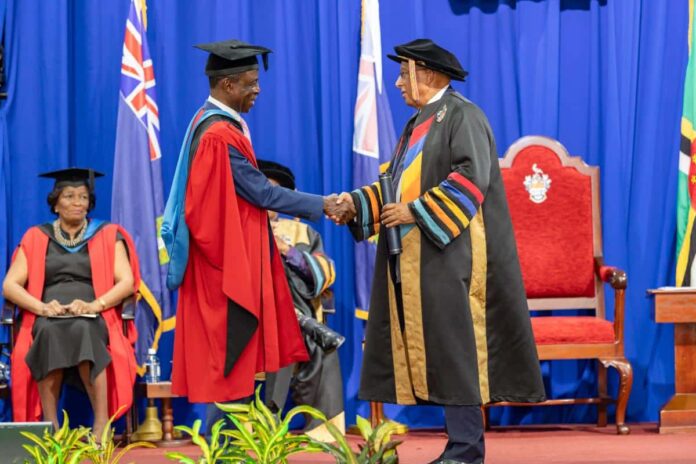Barbadian hotelier calls for construction of hotel on college campus
BARBADOS (November 23, 2024) – Ralph Taylor, a homegrown leader in Caribbean tourism and hospitality, declared that the three critical sectors of entrepreneurship, tourism, and youth will shape the Caribbean’s future and urgently require a collective focus.
In a recent speech coinciding with the acceptance of an honorary Doctorate of Laws (LLD) from The University of the West Indies (The UWI) at Cave Hill Campus in his native Barbados, Taylor praised the university’s focus on teaching entrepreneurship. At the same time, he proposed placing greater emphasis on developing realistic business projects, especially for at-risk youth.
Asserting that the youth entrepreneurship ecosystem ought to be leveraged as strategically as possible, Taylor highlighted the various stakeholders involved: government, the private sector, nonprofits, national youth representatives, media and, most importantly, families. He urged the university to lead the process through its entrepreneurship program and the Cave Hill School of Business and Management.
Taylor stated that this approach could yield significant economic benefits for the country, local communities, and the university, including economic development, diversification, job creation, establishment of viable new businesses, successful products, and an enhancement of university income and prestige.
Taylor is a pioneer in the all-inclusive resort concept in Barbados and currently serves as Chairman and Chief Executive Officer of Arcadia Hotels & Resorts, parent company of The Soco Hotel in Barbados and The Soco House in St. Lucia.
Lauding the university’s success and international recognition for its tourism and hospitality program, Taylor suggested it was time for The UWI to take the next step and build a prestigious resort on the University’s Cave Hill campus overlooking the Bridgetown Port, which could be staffed by students. Cornell University in the United States, rated the world’s best tourism university, owns a hotel which is run by students.
Taylor suggested a similar hospitality initiative would enhance Barbados’ tourism profile while better preparing graduates for the workforce. It would also provide students the opportunity to balance academics with practical experience, making them more well-rounded and competent for the challenging but rewarding world of hospitality.
Academics visiting for conferences and meetings, travelers seeking a unique experience, and students from around the world would be the key market for this initiative.
This model would position the university program in a different space, ensuring that the region develops, recruits and deploys its best thinkers and the most competent leaders in tourism and hospitality management. “I think this is necessary if we are to be globally competitive and among the leaders in tourism and hospitality worldwide,” he stated.
Dealing with at-risk youth across the Caribbean, he averred, was both urgent and deeply complex as rising levels of youth violence impose devastating effects on families and communities. “This violence, often rooted in economic disenfranchisement, social inequality, and a lack of opportunities, threatens our fragile tourism ecosystem and the ability to maintain our sterling global reputation.”
Taylor called for policies, strategies, plans, and practical programs to reintegrate these youths into mainstream society as productive citizens, whether through employment or entrepreneurship. He challenged the region’s private sector to come forward and make meaningful contributions to assist in resolving the problem of youth crime and violence.
Pointing to the research and work of the University’s Institute of Criminal Justice and Security as a step in the right direction, he urged The UWI to go deeper to better integrate with the wider society and community groups. He encouraged further community-based studies to get to the root of the growing youth deviance and violence, and to work collaboratively with social partners in finding solutions to the problem.
Taylor asserted that a democratic civic university actively partners with its surrounding community to implement a curriculum aimed at improving residents’ lives. He emphasized that focusing on positive change and community betterment benefits not only the local population but also enhances the university’s academic offerings and overall success.

Ralph Taylor was awarded an honorary Doctor of Laws (LLD) degree for his work in tourism.



